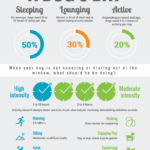Do Dogs Get Cramps
Dogs are some of the most loyal and lovable creatures on the planet. They are our best friends, companions, and protectors. We love them deeply, and we want to ensure their health and well-being at all times. However, just like humans, dogs can experience various health issues that can cause discomfort or even pain. One such condition that dog owners may wonder about is whether dogs get cramps.
Cramps are a sudden, involuntary contraction of muscles that can cause sharp pain and discomfort. When it comes to dogs, they have muscles just like humans do, so it’s natural to wonder if they can get cramps too. In this article, we will explore this topic in detail and provide you with all the information you need to know.
Do Dogs Get Cramps?
The short answer is yes; dogs can get cramps. However, it’s important to note that cramping in dogs is not as common as it is in humans. This is because dogs’ muscles are different from human muscles, and they don’t engage in activities that put them at risk for cramping as frequently as humans do.
That being said, there are situations where dogs may experience muscle cramps. One example is if they engage in intense physical activity or exercise without proper warm-up or stretching beforehand. Another example is if they experience electrolyte imbalances due to dehydration or other factors.
Symptoms of Dog Cramps
If your dog experiences muscle cramps, you may notice the following symptoms:
– Limping
– Stiffness
– Pain
– Discomfort
– Shaking or trembling
In severe cases, your dog may also experience muscle spasms or contractions that last for several minutes. If you notice any of these symptoms in your dog, it’s important to seek veterinary care immediately.
Causes of Dog Cramps
As mentioned earlier, dogs can experience muscle cramps due to a variety of reasons. Some of the common causes include:
– Dehydration – When dogs are dehydrated, they may experience electrolyte imbalances that can lead to muscle cramps.
– Over-exertion – If your dog engages in intense physical activity or exercise without proper warm-up or stretching, they may be at risk for muscle cramps.
– Poor nutrition – Dogs that don’t get the proper nutrients and minerals may be more prone to muscle cramps.
– Certain medications – Some medications may cause muscle cramps as a side effect.
Preventing Dog Cramps
The good news is that you can take steps to prevent your dog from experiencing muscle cramps. Some of the ways to do this include:
– Proper hydration – Ensure your dog has access to clean drinking water at all times, especially during hot weather or after intense exercise.
– Proper nutrition – Feed your dog a balanced diet that provides them with all the necessary nutrients and minerals.
– Stretching and warm-up exercises – Before engaging in any physical activity or exercise, make sure your dog does some stretching and warm-up exercises.
– Avoid over-exertion – Don’t let your dog engage in activities that are too strenuous or demanding for their physical abilities.
Treating Dog Cramps
If your dog experiences muscle cramps, there are a few things you can do to help alleviate their pain and discomfort. These include:
– Gently massaging the affected muscles
– Applying heat or cold packs to the affected area
– Giving your dog electrolytes if they are dehydrated
– Administering pain medication prescribed by your veterinarian
In severe cases, your veterinarian may also need to perform further tests or provide additional treatment options.
Conclusion
In conclusion, dogs can get cramps just like humans do. While it’s not as common in dogs as it is in humans, it’s important to be aware of this condition so you can take steps to prevent it. By ensuring your dog is properly hydrated, well-nourished, and engages in appropriate physical activities, you can help reduce their risk of experiencing muscle cramps. If your dog does experience cramps, seek veterinary care immediately to ensure they get the proper treatment and care they need. Remember, a happy and healthy dog is a cherished member of the family!



